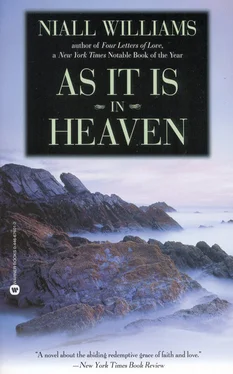But it had not happened. He had courted her with freesias and poetry, and watched himself languishing in the tossed sheets, as if enacting a scene. When at last she had come to his bed, he had visions of roses bursting from the walls and wings growing from the backs of men. He imagined the air itself would take on the perfume of permanent springtime, and he kissed her with a passion that was beyond anything he had known. However, when, two weeks later, he watched her play one of the concerti of Mozart in the Palazzo Musica in Venice, he was struck like a blow with the knowledge that he had not yet loved her into happiness.
Now they drove into Ireland. They drove west along the southern coast in the great disappointment of that outrageous rain. (They did not know that the downpour was already on the point of ending, and that within four days the Gulf Stream would bring a freakish Indian summer that would last into November and make children and old men feel the winter was already over.) It was not only the grey skies that dismayed Pollini, for he had lived through grim Venetian winters; this was something more, a desolate quality he sensed in the grim houses along the roadside, as if they huddled there in the misery of all weathers, barely enduring. When he turned on the radio, he heard the news of a corrupted minister in Dublin, and that a woman had been strangled to death on a farm in County Meath. He wanted an imagined loveliness, a rapture that would make vanish the failings of their passion. He wanted fairyland, not this, and sped the car towards the coastline of Cork, taking the wrong way twice and stopping at a butcher shop where a dog gnawed a bone to ask what the number of the road was. Nobody knew. They told him it was the road to Mallow. He was flushed with embarrassment and sat back in the red car in a collapsed silence. His method in the world was straightforward; you proceed straightforward, you go after what you want, and when you meet an obstacle you ignore it, you go straight through it. Belief is everything. The world will surrender all its treasures if you bang down its doors. So he had raced the car forward in the failing light of late October and carried Gabriella Castoldi in a gesture that since time immemorial has been made against the waning of love: the flight to a new place. Pollini drove with impotent rage and passed through many small towns and villages, not noticing that he was moving constantly inland and away from the extraordinary beauty of the coastline, and only stopping again in the ten o’clock darkness when Gabriella suggested they should stay the night where they were, in a damp guesthouse in Mallow.
The following morning Alessandro Pollini awoke with a head cold. The pressure within him had begun to leak outward, and although the rain had already lifted and the day moved through a dozen different weathers, he knew that love was subsiding in his heart and that he had not the strength to stop it. While he laid back his head and closed his eyes in the passenger seat, Gabriella drove them towards Killarney and the mountains. He slept and woke all day, and by early evening, when they had arrived at a place that overlooked the dazzling crystal of the lakes, he had not the strength to go out for a walk. He went to bed and felt the love draining from him. He stayed in bed the following day, afraid to get up and speak to Gabriella, lest she notice the alarming and unstoppable emptying of love from his eyes. For three days afterwards, Pollini urged it back; he announced love to himself and flashed his looks at the mirror before going down to breakfast. But at last, on the bridge outside the triangular town of Kenmare, the relationship ended. Gabriella told him to go home.
It was a moment that would haunt him for the rest of his life. When she had told him that he no longer loved her, he had denied it. It was impossible to fall out of love like that; it was the place, it was the rain and the mountains, there was something oppressive about the country, about being there on that wet island in the beginning of autumn. It was a place of death. Love was doomed here. He did love her, more than anything. He took Gabriella’s hands in his and bent to kiss them, but she held his face instead and turned it to her. She told him she loved him still, but that it was over, and at that moment he shook uncontrollably and his tears flowed on the bridge beside her, knowing that it was true. Gabriella held him in her arms but did not weep. Then she made the decision that was to change inexorably the rest of her life and make the memory of that moment burn like a Roman candle in Alessandro Pollini’s mind fifteen years later, when he would return to Ireland to search for her memory: she told him to go back to Italy and leave her there.
She had decided to stay in Ireland.
(It was cowardice, the poet admitted later, when he was in old age and had three times married women younger than himself. It was cowardice that had made him not try to convince Gabriella to come back with him. It was the fear of considering too closely that new discovery, the unbearable reality of the emptiness of his own heart. He would have had to travel back across France in the small car, sitting beside the beautiful woman, with the dead child of their loving propped between them. Worse, he would have known it was he who had killed it.)
Pollini left Ireland the next day to return to Italy, and Gabriella Castoldi remained in Kenmare. It was not something she had planned to do, and she did not for the moment have any idea what would come next in her life. She wrapped a long coat about her and went walking about the town. It was a quiet place in the autumn, with the mountains rising on three sides and the Kenmare River running swiftly towards the unseen Atlantic. Mists lingered in the mountaintops, and on a windless afternoon descended to the town, enveloping it as in a fairy tale. The day after the poet left, Gabriella walked around the triangle of the streets of the town. She looked in the windows and bought herself two apples in the small greengrocer’s near the bank. The shop belonged to Nelly Grant, a fresh-faced woman of sixty who looked like forty, wore green fingerless gloves, and believed in the healing powers of fruit. She herself had come to Kenmare from England twenty years earlier, and viewed lone visitors in the autumn with a knowing look, understanding in an instant how easily the mountains and the mist seduced them into never leaving. Nelly Grant knew when she saw Gabriella that the town was enticing her. She had seen the man leaving in the red Fiat and imagined she could detect in Gabriella the ashen look of the end of an affair.
“These please.”
“Two apples? Anything else, dear?” Nelly paused, she let her eyes look over to the far stall, where she had a basket of ruby grapefruit, whose bitterness she knew was the perfect antidote to heartache.
Gabriella did not get the message, and the shopkeeper did not press it. For although she had come to believe completely in the restorative powers of the proper fruits and nuts, and had even converted a great number of the local population to the sweet figs of Portugal and the bottled olives of Morocco, she sensed that Gabriella was not yet ready for the suggestion, and simply slipped a free clementine into the paper bag with the apples.
It was mid-afternoon when Gabriella left the shop and walked out of the town. She already knew the roads and took the rising curve in the direction of Killarney, walking to meet the descending mist and the mesmerized mute faces of the sheep, grazing the grass edges for eternity. Cars slowly passed her. The light was thin and pale, there was a washed translucence in the air, and the feeling of it touching her face was like the tears of someone else. The views into the valley as the road rose were colour-washed with fallen cloud. There was a hush like a blanket, and Gabriella imagined she was walking in the secret landscape of dreams. It was a timeless place. There were no houses, no sounds but the running of small streams, streaking the rock and grass of the mountainsides and gleaming like elvers. Water crossed the road and fell over the edge down into new streams that arrived at last in the lakes below. She walked on. She walked as if the walking itself carried her nowhere and the action of her footsteps was merely a gesture, like treading water, to keep herself alive.
Читать дальше











